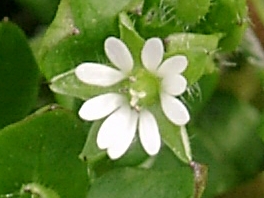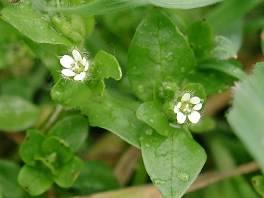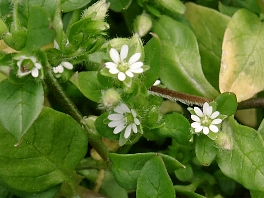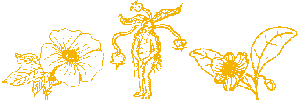 Most garden owners know Chickweed as a weed in their garden.
But Chickweed is a vegetable and salad, that is cultivating on their own
and it helps to protect the naked soil in the garden like a living mulch.
Most garden owners know Chickweed as a weed in their garden.
But Chickweed is a vegetable and salad, that is cultivating on their own
and it helps to protect the naked soil in the garden like a living mulch.
All over the year you can collect the Chickweed and prepare salads, soups and herbal quark. These meals stimulates the digestion and the metabolism.
Chickweed also helps against lots of skin problems.
You can try it against psoriasis and itching eczemas.
Medicinal Uses
- Astringent
- Blood cleansing
- Stops bleeding
- Diuretic
- Mucus-dissolvent
- Cooling
- Coughs
- Bronchitis
- Lung illnesses
- Spring tiredness
- Flatulences
- Constipation
- Haemorrhoids
- Joint inflammation
- Rheumatism
- Gout
- Kidney weakness
- Menses forcing
- Milk strengthening
- Eye inflammation
- Skin problems
- Eczemas
- Psoriasis
- Ulcers
- Leg sore
- Itch
- Wounds that heal badly
- Contusions
- Cuts
- Pimples
- Furuncle
Information
| Used Parts: | Plant |
| Substances: | Ascorbic acid, Saponins, Essential oil, Flavonoid, Coumarin, Mucilage, Zinc |
| Time to collect: | Whole year, best Spring and Summer |
Methods

Wild vegetables
The Chickweed can be collected all over the year and used as a vegetable. You can prepare herbal quark, salads and soups out of the fresh herb.Because of its vitamins, mineral and saponins the Chickweed give new power and it helps against a lot of deficiencies like spring tiredness.
Chickweed is diuretic and it stimulates the digestion and the metabolism. Therefore it is good when dieting and it can help against diseases of the metabolism like rheumatism or gout.
Tea - internally
You can drink dried or fresh Chickweed as a tea (infusion). This can help against rheumatic pains and you can support spring regimens with this tea.The tea from Chickweed can also be used against problems of the respiratory system. It dissolves mucus and can therefore allay cough and bronchitis.
Tea - externally
Chickweed tea can be used externally for washing, as a poultice or as a bath against lots of different problems of the skin.It helps against itching and eczemas. You can try it also against psoriasis.
Bad healing wounds, ulcers and abscesses can be treated with Chickweed poultices. For this purpose it is also good to try the mashed fresh plant as as poultice.
Against problems of the liver you can apply a Chickweed poultice on the area of the liver.
Inflammations of the eye can be treated with bathing the eye in chickweed tea or making a Chickweed poultice.
Ointments
Already in the middle ages people prepared an ointment from Chickweed and lard.Such an ointment can be used against lots of different problems of the skin.
Flower essence
From the flower of the chickweed you can prepare a flower essence.Plant description
 The Chickweed is at home all over the world.
The Chickweed is at home all over the world.
Chickweed can resist cold temperatures, even a bit of frost and keeps growing and flowering. It can germinate beneath the snow and grows on freshly digged beds. When the snow has melted the gardener wonders how this could happen. This makes it possible to collect the Chickweed even in wintertime and make delishes meals from it.
The annual plant is said to be a weed, because it likes to grow on cultivated beds or fields. It only needs short time to cover the area like a carpet. The soil likes to be covered this way because the plant is a protection. It is like a living mulch.
The stalk of the Chickweeds gets up to 40 cm long on grows onm the ground. Where the stalk touches the soil it creates small roots.
The numerous leaves of the Chickweed are small and egglike with a tip.
Chickweed is flowering from March until October. It has small, white flowers, that look like stars. The five petals are divided in two parts that it looks like ten petals. In the morning the flowers unfold and blossom until evening, when they close again. When it is raining they stay closed.
The flowers develop to capsules, where lots of seeds are ripening. One plant can produce up to 10.000 seeds in one year. These seeds are eaten by birds very often, like the herb, that is a favorite meal for chickens.
